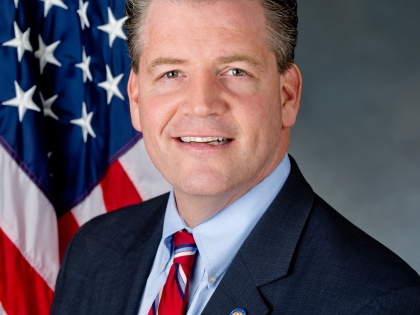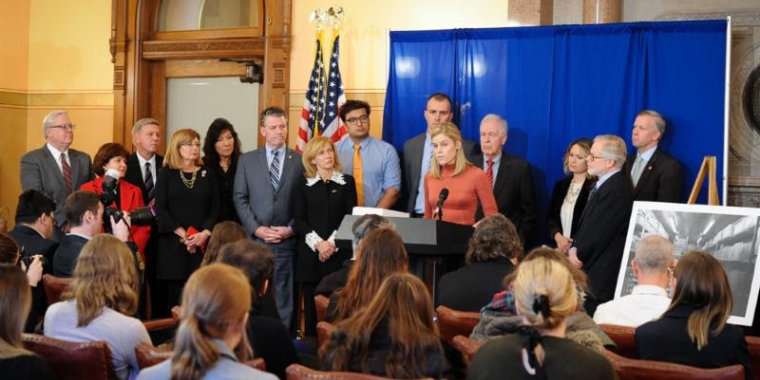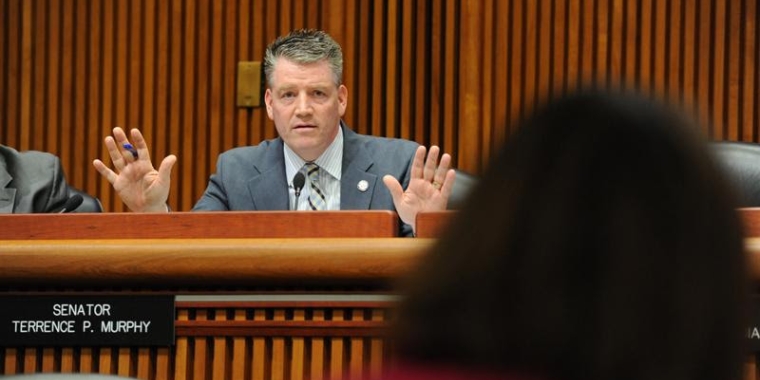
FOILed Again: De Blasio’s Agents of the City, in Money Laundering Memo
June 7, 2016
ALBANY, NY - A leaked memo from Mayor Bill de Blasio's failed 2014 effort to take control of the State Senate details how De Blasio's associates, acting on behalf of candidates, knowingly and willfully solicited, organized and coordinated for the purpose of evading contribution limits. That type of activity may constitute a Class E Felony under Section 14-126(6) of the New York State Election Law, investigators have said.
According to Politico New York, it was one of a series of memos on so-called "earmarking" that were distributed by de Blasio's team to political consultants who the Mayor now says are exempt from state Freedom of Information Law Requirements under the "Agents of the City" exemption. Senator Terrence Murphy today introduced legislation that would make agents of the city subject to FOIL requirements.
"Abusing exemptions to hide from freedom of information law requirements is completely unacceptable," Senator Murphy said. "These agents of the city might have conflicts when they are advising the Mayor as political consultants at the same time as they are working as lobbyists for entities with pending business for the City. If the Mayor has done nothing wrong then he should have nothing to fear from the sunshine and transparency that my legislation will bring about by making these so-called agents of the city subject to FOIL."
The legislation, Senate Bill S8014, would clarify who is subject to the inter and intra agency exception pursuant to the Freedom of Information Law and limit the ability of private contractors with State and Municipal Agencies from representing clients before those agencies while such a contract is in effect. It is expected to be fast-tracked to the Senate floor as part of the negotiations on a broader ethics reform package that could also include Senator Murphy's legislation to heighten campaign finance penalties.
The bizarre loophole the new legislation seeks to close is just one of a series of little-known legal ambiguities Team de Blasio has sought to exploit. Another, known as earmarking, is at the center of the criminal investigation into Team de Blasio's efforts in 2014 Senate races.
A memorandum from Team de Blasio suggests they believed their activity would be illegal earmarking activity only if contributors gave to a straw donor to evade contribution limits knowing how their contribution was being used and refunneled to a candidate.
This flimsy legal argument cites a 1976 advisory opinion from the State Board of Elections, which provides that a contributor to a political committee must not specifically designate how that party may use the funds it receives, under Election Law 14-120.
However, a violation of Election Law 14-120 is not what was alleged to have occurred in last month's bombshell investigation by independent enforcement counsel Risa Sugarman, which said that Team de Blasio perpetrated "willful and flagrant" violations of the election law and referred them for criminal prosecution. In fact, the De Blasio memo does not even discuss section 14-126(6), a separate kind of earmarking which the current criminal investigation centers around.
Section 14-126 (6) reads that "any person who shall, acting on behalf of a candidate or political committee, knowingly and willfully solicit, organize or coordinate ... in connection with the election of any candidate ... for the purpose of evading contribution limits ... shall be guilty of a Class E Felony."
In other words, the contributor or his or her agent would not have had to direct the upstate county committees being used as "straw donors" on how to transfer the contributions in order for Team de Blasio to have committed a crime under 14-126, as alleged in the original 2014 complaint submitted by Senator Murphy which caused the ongoing statewide investigation.
The Team de Blasio memo to agents of the City was silent as to possible violations of 14-126, but other memos could exist and would be subject to FOIL under Murphy's new legislation. The bill would apply to municipalities statewide, and not solely New York City.



